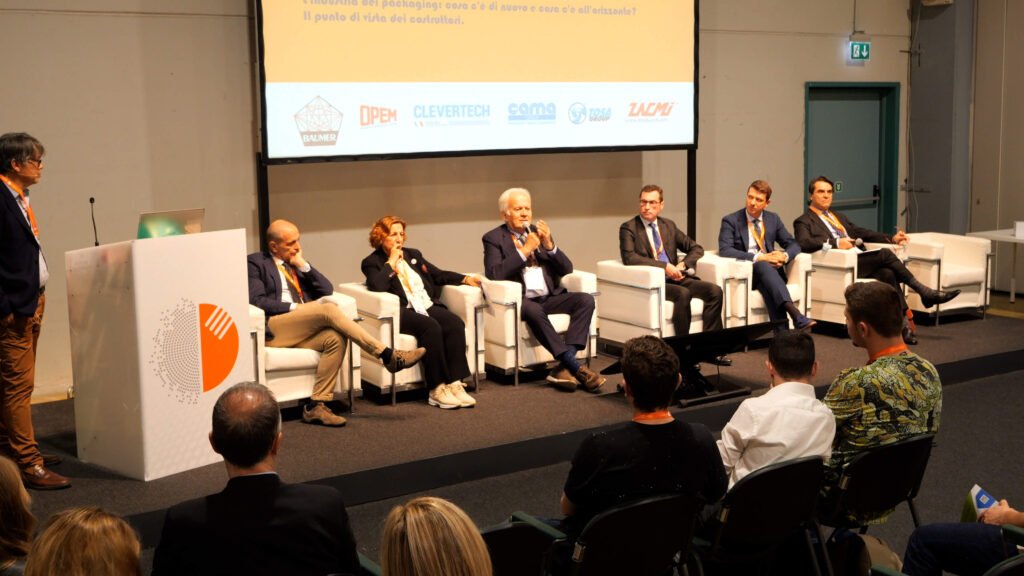The six companies in the Smart Packaging Hub are talking about the future of packaging: plastic minimised, greater use of paper, and aluminium the rediscovered protagonist. Though the market and paradigms change, the ability to innovate whilst maintaining top quality remain constants for success.
What is the future of packaging and how is it shaping up? To sum up the situation there was the meeting organised by the Smart Packaging Hub platform at Cibus Tec Forum, entitled “The packaging industry: what’s new and what’s on the horizon? From the point of view of manufacturers”. On this occasion, the six leading companies of the Smart Packaging Hub illustrated the main innovations in the sector, starting from the awareness that long-term planning has become an increasingly complex matter.
What is certain, however, is that we will no longer be caught unprepared. “A few days before the lockdown,” Giuseppe Reggiani, President and CEO of Clevertech Group recounted, “the traditional acceptance testing of a new plant, which took place remotely with six smartphones, saw us take an altogether new direction. As has often been the case, the crisis turned out to be an opportunity. We learnt to sell and test in a different way, even venturing into ecommerce. We found ourselves rethinking and reorganising our work, with dedicated Operational Units, for a new approach to sales, production and service. At this point, we need to create correct cooperation with consumers, who actually, in terms of packaging, dictate its rules”


Without doubt, one among these prevails over the others: sustainability. This concept, which companies try to frame in its many nuances, keeps reverberating like a mantra. “Sustainability, when speaking about packaging, has several profiles:” pointed out Cristian Sala, Sales Executive Manager at Cama, “though it is often expressed in terms of the lifespan of materials, respect for the environment, the ability to communicate brand values, whilst traceability and transmission of content and information cannot be ignored. Then, there is the entire demand trend for new packaging, hopefully replacing plastic. It is a fascinating challenge. Moving towards sustainable packaging does not simply mean abandoning plastic and switching to cardboard: machines and technologies still need to be adapted to different levels of performance. Because we are pushing ourselves in this direction, we have created new inhouse units that are ready to respond to our customers’ requests”.
And if paper is experiencing its heyday, with three centuries of history, aluminium cans are also making a comeback thanks to their incredible ability to fit into the logic of the circular economy, as Sales Director at Zacmi, Giovanni Motta, expounded: “Today, aluminium seems to be one of the materials with the best price-performance ratio in terms of recycling. Suffice it to say that for every kilogram of aluminium recycled, 6 kg of bauxite and 4 of chemicals are saved, along with 14 kWh. Seventy per cent of all the aluminium ever produced is now still in use. If 2020 saw the manufacture of 350 billion cans, by 2025 we will reach 406 billion, for a turnover in excess of 30 billion dollars. This boom is linked to consumers’ preference for recyclable containers: aluminium cans offer an interesting response in this sense”.
All this requires continuous experimentation by those who produce packaging materials and those who manufacture the equipment that processes products and packaging. To give a real-world example, a major Swiss company has put on sale compressed coffee balls protected by a transparent film, thus eliminating YOUR PACKAGING INSIDER PACKAGING SECTORS the pod container by placing the coffee balls in a compostable case. From the point of view of packaging, this study has developed a highly sustainable product. This is a great innovation, which has made us realise that sustainability is very much present in the packaging process engineering sector”.
No less important, aside from the demand for longer product life, there is the need for protection and safety, especially on the e-commerce side. “Here”, as Baumer’s Sales Manager Massimo Pavani explicated, “PET cannot be replaced so very easily, even though there are alternative plastics available and recycled PET is also currently being used. Companies are asking us to use bioplastics derived from corn, while for secondary packaging we are moving towards pressed cardboard. Our idea is to create a closed cycle where plastic is recyclable and to produce thinner and thinner films, minimising energy consumption and ensuring maximum sustainability of the secondary packaging as well.”
One final aspect concerns tertiary packaging, which is aimed at securing loads. With a focus on food & beverage, Fabio Tosa, General Manager of the Tosa Group, outlined the company’s view of sustainability: “On the subject of stretch film with renewable components, we need to distinguish between two different schools of thought. The first is in favour of thicker film (my) with a higher percentage of recycled plastic components, whilst the second is in favour of a thinner, more technical film with a higher percentage of virgin fibres. The market is also moving back towards paper wrapping. In this regard, we have developed a paper that is “deformable” up to 40% and we have designed a machine to wrap with it. Finally, important changes in sales, production and logistics”, added the CEO, “have led the company to fully embrace the paradigm shift from an end-of-line philosophy to one of integrated logistics”.
What is clear is that companies are moving with increasing conviction towards sustainability and a new way of understanding packaging. Now it is up to consumers to make their own choices, since they too will help determine the packaging profiles of the future.

